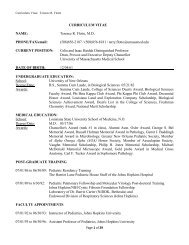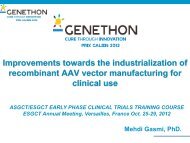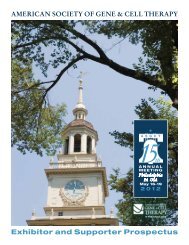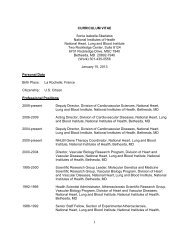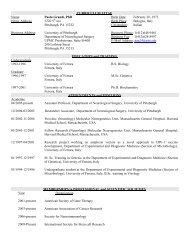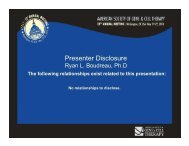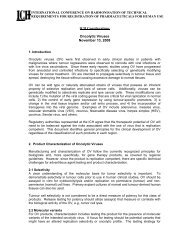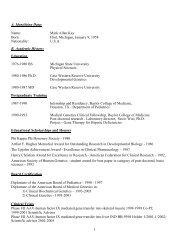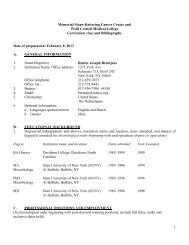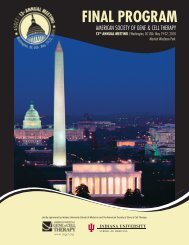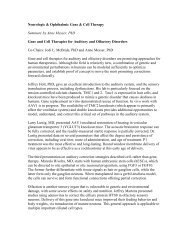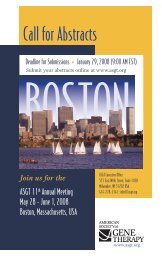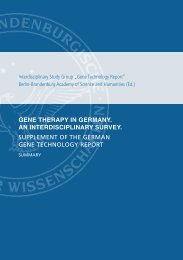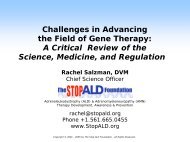FINAL PROGR AM - American Society of Gene & Cell Therapy
FINAL PROGR AM - American Society of Gene & Cell Therapy
FINAL PROGR AM - American Society of Gene & Cell Therapy
Create successful ePaper yourself
Turn your PDF publications into a flip-book with our unique Google optimized e-Paper software.
<strong>AM</strong>ERICAN SOCIETY OF GENE THERAPY • Final Program 27<br />
SCIENTIFIC <strong>PROGR</strong><strong>AM</strong><br />
WEDNESDAY, JUNE 1, 2005<br />
Education Session 112<br />
Regulation <strong>of</strong> Transgene Expression<br />
The ability to regulate the timing and level <strong>of</strong> transgene expression<br />
opened new avenues in basic research applications and might<br />
become prerequisites in future clinical settings. Several gene<br />
regulation systems have been developed and successfully<br />
incorporated into viral and non-viral gene delivery systems. The<br />
session will begin with a general overview on the characteristics<br />
common to the various gene expression regulating systems. The<br />
following parts <strong>of</strong> the session will focus on the most common gene<br />
regulatory systems including the tetracycline, ecdysone, and the<br />
dimerizer systems. The last part <strong>of</strong> this session will cover new<br />
developments in regulating siRNA expression cassettes.<br />
Room: 265/266<br />
Chair: Tal Kafri, PhD<br />
Speakers: Tal Kafri, PhD - <strong>Gene</strong>ral overview on transgene<br />
regulation with special emphasis on the tetracycline<br />
gene regulatory system<br />
Francesco Galimi, MD, PhD - Regulation <strong>of</strong><br />
Transgene Expression: Vector Designs and<br />
Applications<br />
Jakob Reiser, PhD - Knockdown Control:<br />
Practical Approaches to Regulating shRNA<br />
Expression<br />
Education Session 113<br />
NIH Grantsmanship & Funding Opportunities<br />
The goal <strong>of</strong> this session is to acquaint participants with training<br />
and career development application mechanisms and the review<br />
process at the NIH. Staff will give advice on what contributes a<br />
successful grant application and how to pick the right mechanism<br />
depending on the applicant’s expertise and education. There will<br />
be an opportunity for questions during the presentations and NIH<br />
staff will be available for individual questions. This session is<br />
intended for new investigators but should be informative for any<br />
investigator planning to submit an NIH grant application.<br />
Room: 120/124<br />
Chair: Sonia I. Skarlatos, PhD<br />
Speakers: Sonia I. Skarlatos, PhD - Research Training and<br />
Career Development Programs<br />
Steven J. Zullo, PhD - Grant Review in the<br />
CSR<br />
Arun Srivastava, PhD - Writing and Reviewing<br />
NIH Grants: A Personal Odyssey<br />
Education Session 114<br />
<strong>Gene</strong> Transfer to Muscle<br />
This educational session will focus on applications, methods and<br />
strategies for gene transfer to muscle tissue. The first lecture will<br />
give an overview <strong>of</strong> viral vectors for muscle gene transfer in vivo.<br />
The advantages and disadvantages <strong>of</strong> a variety <strong>of</strong> commonly used<br />
vectors with examples <strong>of</strong> their application will be discussed. The<br />
second lecture will focus on non-viral methods for gene transfer to<br />
muscle, which is uniquely suited for uptake <strong>of</strong> non-viral vectors.<br />
The final topic will be on ex vivo methods for gene transfer and<br />
appropriate vectors for transducing stem cells.<br />
Room: 123/127<br />
Chair: Jeffrey Chamberlain, PhD<br />
Speakers: Jeffrey Chamberlain, PhD - Viral <strong>Gene</strong><br />
Transfer<br />
Jon Wolff, MD - Non-Viral <strong>Gene</strong> Transfer<br />
Giuliana Ferrari, PhD - <strong>Cell</strong> <strong>Therapy</strong> for<br />
Muscular Dystrophy<br />
Education Session 115<br />
Building a Strategy for Translational Medicine: Focus<br />
on Immunodeficiencies<br />
The goal <strong>of</strong> this session is to highlight scientific, technological and<br />
logistical aspects that bear on the successful translation and clinical<br />
implementation <strong>of</strong> gene therapy research. This year’s session will<br />
focus on the severe combined immune deficiencies (SCID). The<br />
faculty will discuss their experience with adenosine deaminase<br />
(ADA) deficiency, X-linked SCID and Wiskott-Aldrich<br />
syndrome, with emphasis on the strategic choices they have made<br />
and the hurdles they have confronted on issues such as vector/<br />
promoter selection, small vs. large animal models, vector<br />
production, infrastructure development, protocol approval, patient<br />
selection and recruitment, quality assurance and regulatory<br />
oversight.<br />
Room: 230/231<br />
Chair: Michel Sadelain, MD PhD<br />
Speakers: Donald B. Kohn, MD - ADA-Deficient SCID:<br />
Pathogenis and Treatments<br />
Marina Cavazzana-Calvo, MD, PhD - Severe<br />
Combined Immunodeficiency: Disease Models for<br />
New Therapetical Approaches<br />
Arthur Nienhuis, MD - Development <strong>of</strong> <strong>Gene</strong><br />
<strong>Therapy</strong> for Wiskott-Aldrich Syndrome<br />
DINNER BREAK – 6:45 PM - 8:30 PM



